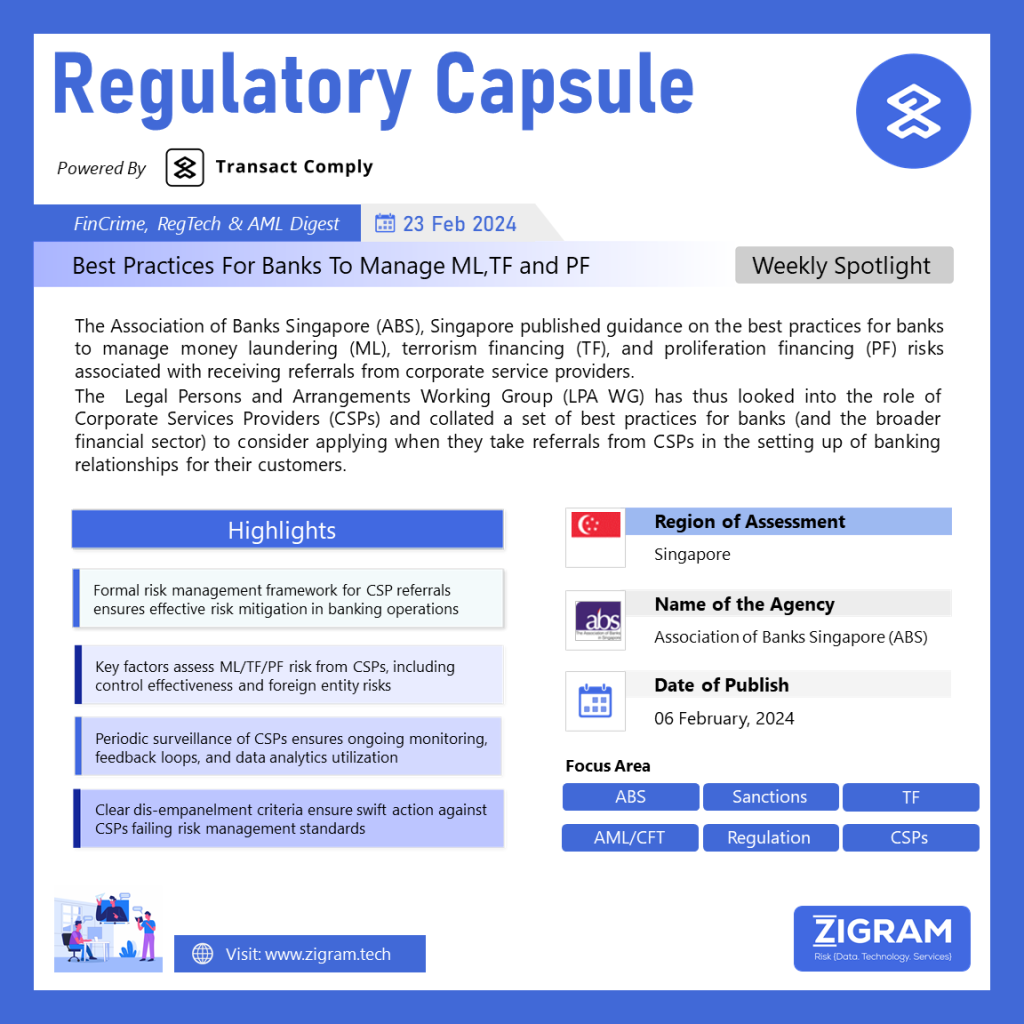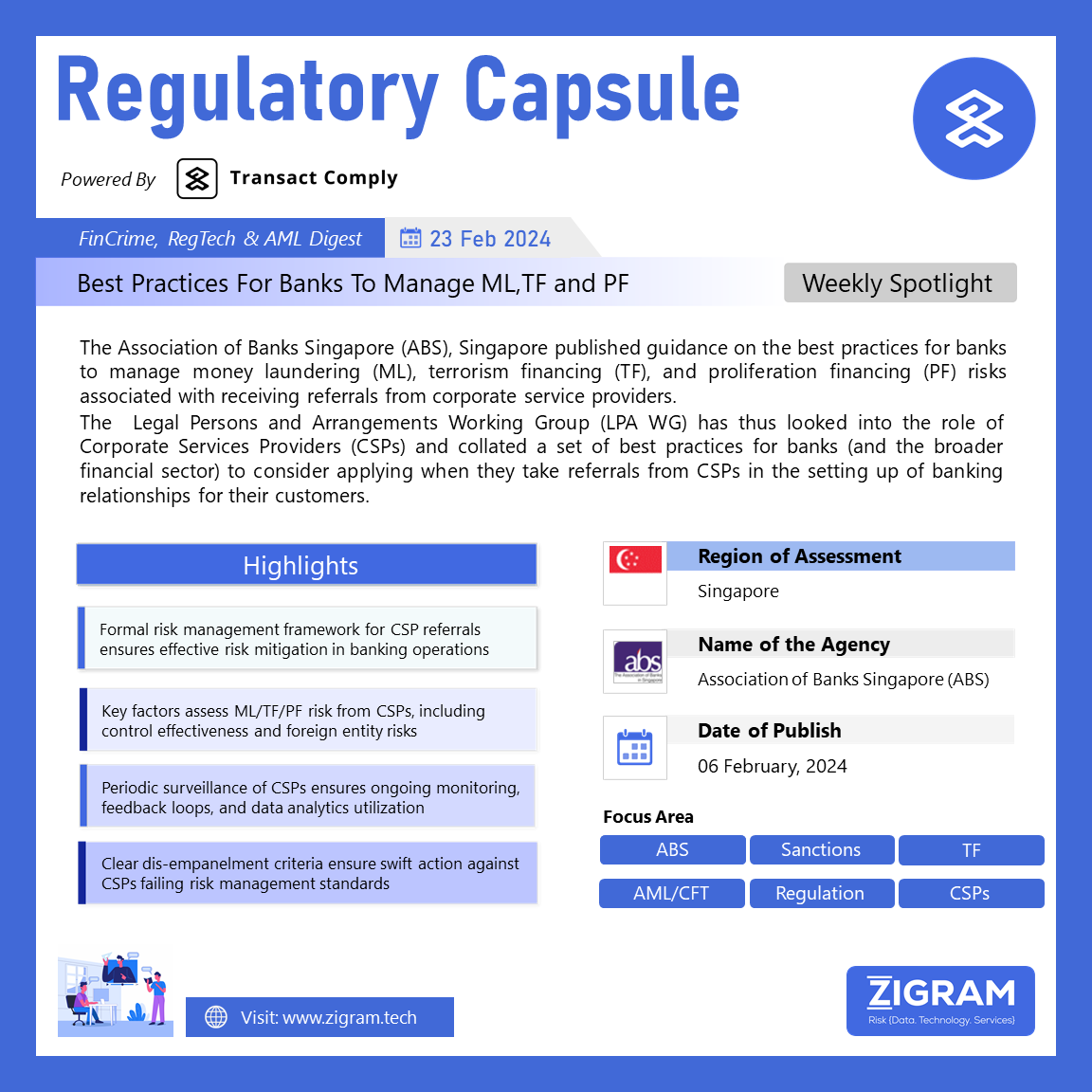Published Date:
Regulation Name: Best Practices For Banks To Manage ML, TF, PF Risks Associated With Receiving Customer Referrals From CSPs
Regulatory Update Date: 06 February 2024
Country: Singapore
Agency: Association of Banks, Singapore
The Association of Banks Singapore (ABS) released guidance on best practices for banks to manage money laundering, terrorism financing, and proliferation financing (ML/TF/PF) risks associated with receiving referrals from corporate service providers (CSPs). The guidance underscores the importance of establishing robust control frameworks to mitigate specific risks arising from CSP referrals in the setup of banking relationships for customers.
Key recommendations include:
1. Formal Risk Management Framework: Banks are advised to establish formal risk management frameworks tailored to address ML/TF/PF risks linked to receiving customer referrals from CSPs. Such frameworks ensure an adequate structure is in place to identify, manage, and mitigate risks introduced by CSPs.
2. CSP Empanelment Process: Introducing an empanelment process formalizes the management of CSPs from which banks receive referrals. This process enhances oversight and accountability, allowing banks to assess the suitability and reliability of CSPs before engaging in referrals.
3. Assessment of ML/TF/PF Risks from CSPs: Banks should outline key factors used to evaluate the level of ML/TF/PF risk associated with each CSP referring customers to the bank. Factors for consideration include the effectiveness of the CSP’s controls framework, the risk associated with CSP controllers, assessment of foreign CSP risks, among others.
4. Periodic and Ongoing Surveillance: Banks are encouraged to implement processes for periodic and ongoing surveillance of CSPs from which they receive referrals. This includes continuous monitoring, review of adverse information or intelligence related to the CSP, feedback loops to assess the quality of referred customers, and utilization of data analytics to detect unusual transaction patterns.
5. CSP Dis-empanelment Process: Clear internal triggers and criteria should be established within the bank’s framework to initiate the dis-empanelment of a CSP failing to meet risk management standards. This ensures swift action against CSPs posing significant ML/TF/PF risks.
Furthermore, banks are urged to consider formalizing a comprehensive risk management framework to ensure consistent standards in understanding and evaluating ML/TF/PF risks associated with CSP referrals. This framework should include elements such as defining the bank’s risk appetite concerning the types of CSPs from which referrals are accepted.
The risk appetite should consider various factors, including the registration status of foreign CSPs in high-risk jurisdictions, supervision by foreign authorities for AML/CFT compliance, consistency of AML/CFT requirements with FATF standards, and conditions imposed on ultimate beneficial owners (UBOs) or key representatives of the CSP. For instance, legal and accounting firms providing CSP services may be deemed low risk if they have well-established AML/CFT controls or standards, or if certain conditions are met concerning the UBO or key representative’s professional background and absence of adverse information.
In summary, the ABS guidance emphasizes the need for banks to adopt comprehensive risk management practices to effectively address ML/TF/PF risks associated with CSP referrals. By implementing the recommended measures, banks can enhance their ability to identify, assess, and mitigate risks arising from CSP engagements, thereby strengthening the overall integrity of the financial system.
- #BankingRiskManagement
- #CSPReferrals
- #AML
- #TF
- #PF
- #FinancialSector
- #RegulatoryGuidance
- #RiskMitigation
- #Compliance
- #FATF
- #RiskAppetite
- #UBO
- #FinancialIntegrity
- #ABSGuidance

